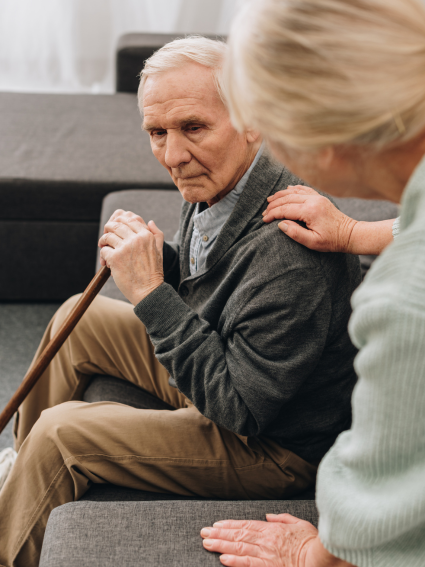september 1, 2023
navigating the stages of grief when a loved one has dementia
a guide for caregivers

Caring for a loved one with dementia is a journey that often brings about a unique form of grief. The progressive nature of dementia means that caregivers experience a series of emotional stages as they witness the gradual decline of their loved one’s cognitive and functional abilities. It’s important to note that these stages are not linear – caregivers may move in and out of different stages as they and their loved one navigate the disease process together.
STAGES OF GRIEF
- Denial: In the early stages of caregiving, it’s common to feel a sense of denial about the diagnosis. Caregivers might find themselves thinking, “This can’t be happening,” or “It’s just forgetfulness.” There is an attempt to normalize problematic behaviors and a hope that the person will get better. To some degree, this stage serves as a protective mechanism, allowing caregivers to gradually absorb the reality of the situation.
- Anger and Frustration: As the impact of dementia becomes more apparent, caregivers often experience feelings of anger and frustration. These emotions can be directed at the disease itself, the unfairness of the situation, or even at the loved one for their changing behavior. There may also be feelings of resentment towards family members who cannot or will not help provide care.
- Guilt: Unrealistic expectations and lingering regrets from life before the dementia diagnosis quite predictably result in feelings of guilt. A seemingly endless string of “I should haves…” leave one feeling like a failure; and negative thoughts about a loved one can result in feelings of shame and self-reproach.
- Depression and Sadness: As dementia continues to progress, caregivers often grapple with profound sadness and an overwhelming sense of loss. They mourn the person their loved one used to be and grieve the loss of shared memories and experiences. Caregivers may find themselves crying frequently or withdrawing from social activities.
- Acceptance and Adjustment: Reaching a stage of acceptance doesn’t mean that caregivers are okay with the situation. Instead, it signifies a recognition of the reality and a willingness to adapt to the new circumstances. Caregivers begin to focus on providing the best possible care, finding joy in small moments, and maintaining their own well-being.
STRATEGIES FOR COPING WITH GRIEF
Throughout each of these stages, it’s important to remember the importance of self-care. Taking breaks, seeking support, and maintaining one’s physical and mental health are vital components of being an effective caregiver. Other strategies for coping with grief and loss include:
- Acknowledging Your Feelings: Allow yourself to feel sad and frustrated. Know that it’s OK to feel conflicting emotions – such as love and anger at the same time. These are normal, healthy responses to what you are facing.
- Recognizing That Feelings of Loss Come in Waves: As your loved one’s dementia progresses, you will experience feelings of loss again and again. This is a normal part of the grieving process.
- Avoiding Comparisons Between Your Grieving Process and Others’: We all grieve differently and at our own pace. Take the time and find the support that YOU need.
- Giving Yourself Permission to Keep Being You: Don’t give up enjoyable activities and companionship. Find time for the hobbies you love, and make lunch, coffee, or walking dates with your friends. Fueling your soul with the things that bring you joy will give you the energy you need as you journey through the dementia process.
- Knowing That You Are Not Alone: Your close friends want to help. Ask for and accept it. You would, and might very well one day, do the same for them. Beyond personal relationships, there are caregiver support programs, educational resources, and a wide range of services, including Adult Day Programs like Winter Growth’s, that can provide the information and respite that you need.
- Joining a Support Group: Whether virtual or in-person, support groups provide an opportunity to talk with other caregivers, to share your emotions, and to cry, laugh, and learn together. Winter Growth offers a virtual group at 1pm on the last Thursday of each month (email bailey.clum@wintergrowthinc.org to register) and you can find other local support groups by visiting the Alzheimer’s Association’s Virtual and In-Person Resource Page.
The unique grief experienced as a caregiver is a profound companion on what seems an impossible journey. As you find your way, know that you are loved. That others care. And that help is available.
Resources:
Anticipatory Grief When Caring for a Loved One with Dementia
Alzheimer’s Association: Grief and Loss as Alzheimer’s Progresses
Dementia Grief – Part 1: The Unique Characteristics
Enjoy the article? Be sure to Subscribe to Winter Growth’s Live Joyfully Blog to receive a notification when new posts are available!

Winter Growth’s founder dreamed of creating a community where seniors and adults with disabilities could continue to learn and grow – filling their lives with joy and purpose. For over 40 years, we have fulfilled her vision by providing unique, affordable Assisted Living/Memory Care and Adult Medical Day Care tailored to our clients’ individual abilities, interests, and lives.

